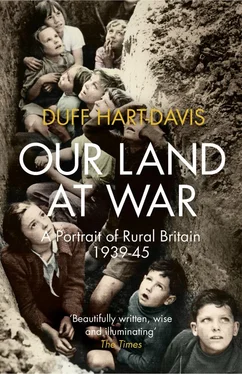The agents created for achieving results were the County War Agricultural Executive Committees (commonly known as ‘War Ags’), reincarnations of similar bodies set up during the First World War. There was one War Ag committee for each of the fifty-two counties, made up of seven to ten unpaid local men, experts in various fields, principally farming. These then appointed sub-committees to deal with individual areas. Whenever they were photographed for one of the agricultural journals, attending demonstrations of new machinery or going out to inspect a farm, committee members turned out in uniform of suits and bowler hats or trilbies – although often the Chairman can easily be identified as a landed gentleman from his tweed jacket and plus-fours as he sits in the centre of the front row.
The officials were empowered to walk anybody’s land and prescribe what needed to be done, even down to decreeing which crop was to go in which field, and the dates by which crops must be planted. If a farmer agreed to be helped, the Committee would loan him machinery from a pool, and extra labour whenever it could be found. If he refused to plough as directed, or his land was in too bad a state for him to tackle it, the War Ag could take over his whole operation and run it with their own men and machinery, or offer the tenancy to someone else.
A leader in the The Farmers’ Weekly warned readers that the Minister might also ‘authorise persons to enter upon land for the purpose of preventing or minimising injury to crops or wastage of pasture by birds, hares, rabbits, deer, vermin or pests, for the purpose of increasing the supply of food to the United Kingdom’.
In other words, the Minister of Agriculture has more or less complete power over the farming of this country … County authorities will have a difficult and thankless task. They will be servant and whipping-boy, adviser and master. They will do their best to be friend as well.
To men with strong territorial instincts, whose families had always managed their own land, at their own pace, for generations, such draconian intervention came as a shock. Many resented being given orders by strangers, and were suspicious of officials who, having walked their fields in city suits, then told them what to do. Still worse, if a difficult decision had to be taken, the whole of the War Ag committee might turn out in force to assess the position – a posse of interlopers tramping over the fields, and an even greater insult. Yet it was no use arguing. Anyone who rejected the Committee’s suggestions was liable to be fined, and, if he still refused to cooperate, to be evicted from his house and holding.
One such was Merriam Lloyd, owner of Dove Farm at Akenfield, in Suffolk. The story was told to Ronald Blythe by Lloyd’s grandson Terry:
He was a bachelor who walked about with a gun – you know the sort. He was very independent, and nobody could tell him anything. He knew it all. His farm wasn’t much when he bought it, by all accounts, but it was a sight worse when the Second World War broke out. He hadn’t done a thing except walk round it. Of course the War Ag told him to plough up his meadows – told him! Of course, he wasn’t having that. He took no notice. So they pushed him out. Some men came and literally pushed him out of his own front door. Then they brought some bits of furniture out and stood it round him on the lawn. They wanted the house, you see, for administration. Well, he went to live in a shepherd’s hut in the orchard, where he stayed all through the war, and doing absolutely nothing, of course, and the Dove was given to Jolly Beeston to farm.
In a still more extreme case a farmer refused to plough his land, as directed, then ignored an eviction order. In the words of the historian Sadie Ward,
The police were sent in, only to find the farmhouse secured against them and the farmer armed with a shotgun. After an exchange of shots and the unsuccessful use of tear gas, the police, backed up by troops, forced an entry. Continuing to resist arrest, the farmer was shot dead.
Even minor infringements of the Tillage Act were mercilessly punished. Two poor old farmers in Northern Ireland, both in their seventies, and with tiny holdings of ten and eleven acres, were fined £20 and £18 for falling short with their ploughing. The Ministry of Agriculture rejected their appeal, saying that the Act had been introduced in the national interest, and that no breaches of its provisions would be tolerated.
Between 1939 and 1945 some 15,000 farmers were forcibly dispossessed – a figure that sounds distressingly high, until one takes account of the fact that it represented only about 5 per cent of the agricultural holdings at that time. A great many farms changed hands: some were sold at auction in the normal way, but at the end of the war land would be offered back to an evicted owner, and if for any reason he did not want it, or if he had died, it would go on the market.
Most farmers were glad of help, and many were grateful to be relieved of responsibility. As one former official put it, ‘They looked upon us as saviours.’ When, after struggling with years of deficits, they saw money begin to roll in, they often became positively enthusiastic.
In the experience of Derek Barber (later Lord Barber), who was a student at the Royal Agricultural College in 1938, and then a member of the Gloucestershire War Ag committee, ‘the war made everyone realise how important food production was. Simple people were introduced to more sophisticated ways of working the land.’ Seventy years later he was still haunted by the memory of finding a young man dragging dung out of a horse-drawn cart with a pitchfork. The farm was a mass of weeds, and the mother sat in the house all day while her son did what he could to keep things under control. The farm had ‘got into a terrible muddle’, and Barber managed to persuade the family to accept help. The War Ag took over, paid some rent and lifted the family out of their despair.
Derek Barber’s mentor was Professor Robert Boutflour, Principal of the Royal Agricultural College at Cirencester since 1931, and Chief Executive Officer of the Gloucestershire War Ag. Son of a farmer in Northumberland, he was short, stocky and boiling with energy – a tremendous man-manager: his ability to generate enthusiasm spurred countless farmers into far more effective action than they had thought possible, and he became a symbol of the war effort, in that he made the best of everything given him. One night he telephoned Barber and said, ‘There are a hundred tons of potatoes arriving at Moreton-in-Marsh station at six tomorrow morning. Plant ’em.’
‘We haven’t got any land to plant them,’ Barber protested.
‘Plant ’em,’ said Boutflour, and put the receiver down. ‘A patch of ground was found on the side of a hill, the spuds were planted, and it became known as “Barber’s folly”.’
Boutflour was nothing if not outspoken. One of his well-known observations was that ‘a farmer with 150 acres is equal to a brigadier-general in the army’.
When people started complaining about bacon rationing, he wrote in Country Life : ‘One British habit is causing a great deal of worry, and that is the demand for bacon for an Englishman’s breakfast. Why should we worry? No other man in the world asks for such a breakfast, not even in countries where most bacon is produced.’ He went on to say that the oatmeal from a field of oats would produce ‘eight times as many good breakfasts in the form of porridge as would the same oat-meal converted into bacon … Bacon for breakfast is a habit, almost a vice.’
Ploughing was accelerated by the issue of tractors, of which the Ministry had a pool. Through the War Ags it distributed them all over the country according to the nature of the land: fifty went to Devon, where grassland predominated, but only ten to Essex, much of which was already down to cereal crops. Progress was hampered by violent changes in the weather. The summer of 1939 had been gloriously hot (bringing out a plague of adders in the New Forest), but it left the ground baked hard and difficult to break up. Then October turned cold and wet, and in November frosts set in – the first of a bitter winter which brought cultivation to a halt and, in several places, froze the Thames from bank to bank, so that ice-breakers were working in the river.
Читать дальше












